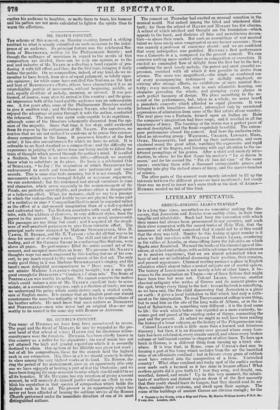MR. NEATE'S CONCERT, TEM selienie of this concert, on Monday
evening„ formed a striking benithist to what is usually submitted on such occasions to the indul- kence of an audience. Its principal feature was the celebrated Sin- fonia of BEETHOVEN, written for the Philharmonic Society ; and though the sulfrap-,es of musicians in regard to the merits of this composition are divided, there can be only one opinion as to the zeal and industry of Mr. NEATE in collecting a band capable of pro- ducing it with full effect, and thus, for the first time, bringing it fairly before the public. On no composition, indeed, of any kind, do we re- Member to have heard, from men of equal judgment, so totally oppo- site opinions ; for while some have extolled this Sintbnia as the first and best of BEETHOVEN'S efforts; others have characterized it as an jumble of movements, without beginning, middle, or end, equally destitute of melody, meaning, or interest. It was ner- feinted, Of course, soon after its arrival in this country ; and the gene- ral impression both of the band and the audience was an unfavourable one. A few years after, some of the Philharmonic Directors wished to give it another trial ; and Sir GEORGE SMART, who had recently enjoyed the advantage of going through it with the author, conducted the rehearsal. The result was again unfavourable to its repetition ; although some of the .Directors vehemently dissented from the opi- nion of the majority. Since that time, it has slept, until awakened frth AS repose by the enthusiasm of Mr. NEATE. For ourselves, we Confess that we are not inclined to condemn or to praise this extraor- dinary composition in the lump. It possesses beauties of the first order; it has also uncouthnesses for which we have no relish. It is referable to no fixed standard as a composition ; and the difficulty we experience in judging of it, arises from our being unable to follow the train of thought which passed through the author's mind. It is called a Sinfonia, but this is an inaccurate title,—although we scarcely know what to substitute in its place. Its basis is a celebrated Ode of SCHILLER, "to Joy ;" the inspiration of which BEETHOVEN has endeavoured to catch and transfuse into instrumental mid vocal sounds. This is some clue to its meaning, but it is not enough. The Movements which express tranquil delight or rapturous enjoyment, we can understand ; but the continued and abrupt variations in time and character, which occur especially in the commencement of the Finale, are perfectly unintelligible, and produce either a disagreeable or a ludicrous effect. What, for instance, shall we say to a passage in which the violoncellos and double basses are playing the voice part of a recitative in time Composition like this must be regarded rather as the effect • of a distempered imagination than of a well-regulated and cultivated taste. The Sinfonia concludes with vocal solos, quer- tetts, with the addition of choruses, in very different styles, from the gayest to the gravest. Here; BEEtuoVEN is, as usual, unsuccessful. His passages are any thing but vocal ; and it required all the steadi- ness of well-practised performers to give them tolerable effect. The principal parts were sustained by Madame STOCKHAUSEN', Miss H. CAwsE, M. BEGREZ, and Mr. E. TAYLOR; who did all that was to be done for music of so strange a cast. The skill and talent of MORI in leading, and of Sir GEORGE SMART in conducting this Sinfonia,, were above all praise. Its performance filled the entire second act of the concert, and occupied more than an hour. We presume Mr. NEATE'S thoughts were too much engrossed by this leading feature of his con- cert, to pay much regard to the vocal music of his first act. The only really good thing in it was Madame STOCKHAUSEN'S singing, and the band's most delightful aecompaniment to t` Dove sono." We did not admire Madame LALANDE'S singing to-night; but it was quite good enough for DONIZETTI'S " Confusa, e I alma mm." The finale of PORTOGA.LLO was worthy its author. We cannot conceive the motive which could induce a man of Mr. NEATE'S excellent taste to accu- mulate, at a considerable expense, such a collection of trash ; nor can We understand the policy which could dictate such a studied exclu- sion of English music. It is strange that an English professor should countenance the senseless antipathy of fashion to the compositions of his brother artists. He must know that such writers as DONIZETTI ñd PORTOGALLO—men who never had an original idea—are not worthy to be named in the same day with BISHOP or ATTWOOD.


















 Previous page
Previous page